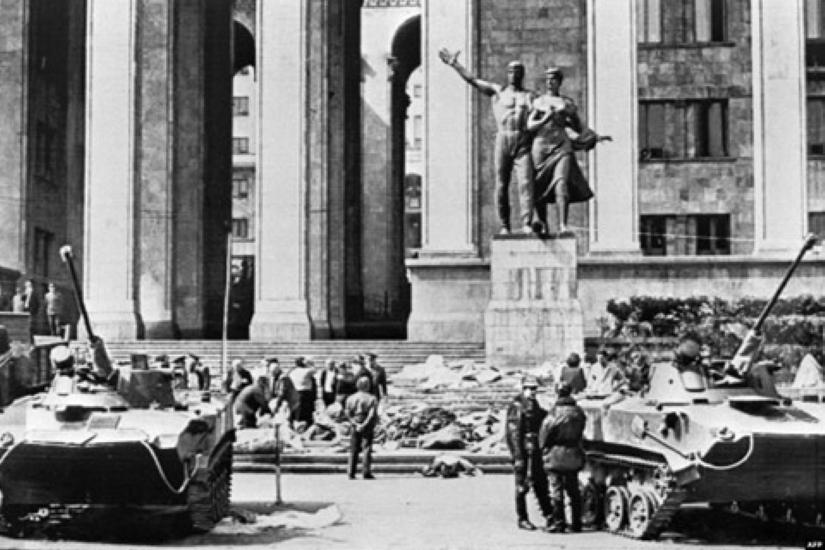
To receive the Zoom-link, please RSVP at democracyinhistory@ceu.edu
The events of the late Soviet period and the first years of independence in Georgia played a key role in the history of the country and determined its future development. In the presented study, they are analyzed in the framework of the theories of collective memory and cultural trauma; the concept of trauma of victory is also applied. This roundtable is to give an overall view of the book and to open discussion on the pressing issue of trauma and progress in post-transition countries.
The collapse of the Soviet Union, restoration of independence and radical changes in the social, economic, and political systems marked a painful period of unexpected facts and events in Georgia: April 9, 1989, the 1991-1992 Tbilisi War and civil strife across the country, conflicts in Abkhazia and the Tskhinvali region, natural disasters, economic collapse, social hardships, and energy crisis. Despite the common traumatic nature, perception of these developments and their influence on the society was not uniform. On the collective level, some tragic facts that resulted in casualties gave rise to both pain and the feeling of victory gained through sacrifice. Some other facts aroused the feeling of shame and crime, as well as a desire to forget them. Therefore, in order to fully comprehend these facts, alongside with the concept of cultural trauma, we applied the concept of triumph as well.
In the course of the research, we sought out, classified, and analyzed different narratives that defined the perception of the events as trauma or triumph, as well as their remembering or forgetting. These sources are extremely diverse – they vary between official documents, literary texts, various types of printed and social media, photo and video materials, and different sites of memory. They are noteworthy in terms of social attitudes, emotions, and moods. Survey-based interviews with the target groups aimed to verify the results obtained via other research methods. Oral histories recorded from June 2020 to February 2021 form an interesting collection of sources, which reveal how the two April 9s, the civil confrontation, and the 90s are remembered in different social and age groups, and whether they managed to overcome the trauma. Oral histories enabled to see individuals behind the research questions, to “bring to life” their emotions, which were decisive for remembering or forgetting.
Program
May 6, 2022
9:30 Coffee, tea, small breakfast at Kávétársaság
Start at 10:00 AM
10:00 - 10:30
Balazs Trencsenyi, Professor, CEU Department of History; Lead Researcher, Democracy in History Workgroup, CEU Democracy Institute; the project consultant
Opening and the introductory words
10:30 – 10:50
Nino Chikovani, Professor, Ivane Javakhishvili Tbilisi State University
April 9 and the Civil War: Pain, Triumph and Shame in the post-Soviet Georgian Memory
10:50 – 11:10
Ketevan Epadze, PhD Student, Ivane Javakhishvili Tbilisi State University
“Cries and Whispers” of Memory: April 9 and the Civil War in the Memory Politics
11:10 – 11:30
Ketevan Kakitelashvili, Associate Professor, Ivane Javakhishvili Tbilisi State University
Natural Disasters: Echo of the April 9
11:30 – 11:50
Ivane Tsereteli, Associate Professor, Ivane Javakhishvili Tbilisi State University
Trauma and Triumph in Literary Texts
11:50 – 12:10
Ketevan Kakitelashvili, Associate Professor, Ivane Javakhishvili Tbilisi State University
“The Dark 90s.” The Trauma of Everyday Life
12:10 – 13:00
Coffee break at Kávétársaság
13:00 – 14:30
Discussion on the presentations and the book talk: Georgia: Trauma and Triumph on the Way to Independence
Discussant(s): Gábor Egry, Róbert Takács
18:30 -
Dinner at Strudel House Budapest, Első Pesti Rétesház (1051, Október 6. utca 22).
May 7, 2022
13:30 Coffee, tea, snacks at Kávétársaság
14:00 Roundtable
The book was prepared in the framework of the project financed by Shota Rustaveli National Science Foundation of Georgia (Grant N FR-18-3459)